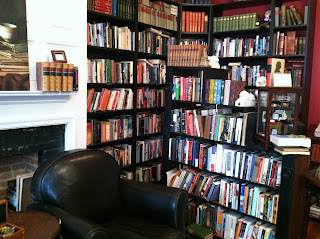I remember clearly my middle-school lessons on literary devices. These were the classes in which we learned to pick apart the writing in front of us. We identified similes, metaphors, and hyperbole, metonymy, synecdoche, and litotes. I found it fascinating, wonderful, exploratory. I’ve dissected my reading ever since, often unconsciously. Foreshadowing, though, proved a sticking point to my eleven-year-old mind:
foreshadow: to indicate, represent, or typify beforehand: PREFIGURE (
Merriam-Webster)
To me, this meant one thing: giving away the ending before it happened. But what I could not grasp was why an author would do such a thing -- and intentionally, no less. Or, perhaps more crucial to my argument, why a reader would continue to read if they had been told how things would turn out.
I’m sure the fact that I spent my days reading the like of The Babysitter’s Club and Redwall has something to do with this opinion. While both series remain near and dear to me, neither rests on the laurels of its writing alone, instead being driven by plot and conclusions. Perhaps most middle-school grade reading is like that, or maybe it was just my tastes at the time.
As I work my way through Stephen King’s latest masterpiece,
11/22/63, I find my thoughts frequently returning to these days of learning literary devices. King, a master of foreshadowing, is connecting the dots for me. He frequently lets slip just enough of what is to come to make it purely impossible not to turn the page. Look what’s going to happen, he seems to be whispering. Don’t you want to find out how we get there?
And while the plot of
11/22/63 is engaging and enticing, it is this “how we get there” that proves the best part of King’s writing. Because in between each crucial event, each twist and unexpected turn, King reflects on the nature of 1960s America, on the differences between the recent past and today, on the nuances and difficulties of time travel. These are the morsels of his writing most worthy of devouring.
There are books where foreshadowing makes what follows all the more powerful. The final, heartwrenching scene of Steinbeck’s
Of Mice and Men is not necessarily built on foreshadowing alone, but it is made all the more emotional because we, the reader, know what George must do. We know why he leads Lennie on in believing in the farm, and the rabbits, and their peaceful future together. It cuts to the quick, that knowledge. Gabriel Garcia Marquez’s aptly
named
Chronicle of a Death Foretold opens with the announcement of a murder: “On the day they were going to kill him, Santiago Nasar got up at five-thirty in the morning to wait for the boat the bishop was coming on.” What follows in the next 120 pages is an account of how we got to this murder, this death we’ve known about all along. As a reader, we are curious: how do we move from a bishop to a murder? But knowing that it all ends in a death, we also see each mundane, everyday action tinged with the darkness of finality.
Knowing the ending, I’ve realized, does nothing to spoil the beginning and the middle. It changes the experience of reading, of course, but not necessarily for the worse. After all, what of re-reading? Readers tend to fall into two camps on this subject: there are those who do, and those who don’t. Those of us who do certainly do not do so in order to find out what happens. Presumably, we already know. We re-read to re-discover the beauty of the writing, the love we have for a story, the joy of immersing ourselves in something we already know we love.
I no longer read such plot-driven work as I did in my middle school years, preferring instead the slow and steady pace of literature crafted with as much mind for sentence construction and imagery as for the plot itself.
The Night Circus, criticized by many as meandering and slow, was just such a book. And Pete Hamill’s
North River, a book of Depression-era New York City, is a gripping story, but as delightful for its setting as its outcome.
Perhaps this is why I find myself now more amenable to foreshadowing in a work. Or perhaps it is part of the art of learning to read--learning to appreciate the act of being
in the story, rather than The End.













